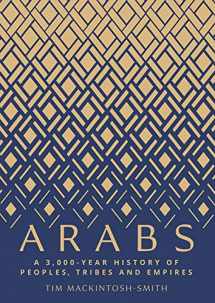
Arabs: A 3,000-Year History of Peoples, Tribes and Empires
ISBN-13:
9780300180282
ISBN-10:
0300180284
Edition:
First Edition
Author:
Tim Mackintosh-Smith
Publication date:
2019
Publisher:
Yale University Press
Format:
Hardcover
656 pages
Category:
North Africa
,
African History
,
Egypt
,
Middle East History
,
Jordan
,
Kuwait
,
Oman
,
Saudi Arabia
,
United Arab Emirates
,
Yemen
,
Linguistics
,
Words, Language & Grammar
,
History
,
Islam
,
Muhammed
FREE US shipping
Book details
ISBN-13:
9780300180282
ISBN-10:
0300180284
Edition:
First Edition
Author:
Tim Mackintosh-Smith
Publication date:
2019
Publisher:
Yale University Press
Format:
Hardcover
656 pages
Category:
North Africa
,
African History
,
Egypt
,
Middle East History
,
Jordan
,
Kuwait
,
Oman
,
Saudi Arabia
,
United Arab Emirates
,
Yemen
,
Linguistics
,
Words, Language & Grammar
,
History
,
Islam
,
Muhammed
Summary
Arabs: A 3,000-Year History of Peoples, Tribes and Empires (ISBN-13: 9780300180282 and ISBN-10: 0300180284), written by authors
Tim Mackintosh-Smith, was published by Yale University Press in 2019.
With an overall rating of 4.0 stars, it's a notable title among other
North Africa
(African History, Egypt, Middle East History, Jordan, Kuwait, Oman, Saudi Arabia, United Arab Emirates, Yemen, Linguistics, Words, Language & Grammar , History, Islam, Muhammed) books. You can easily purchase or rent Arabs: A 3,000-Year History of Peoples, Tribes and Empires (Hardcover) from BooksRun,
along with many other new and used
North Africa
books
and textbooks.
And, if you're looking to sell your copy, our current buyback offer is $7.93.
Description
A riveting, comprehensive history of the Arab peoples and tribes that explores the role of language as a cultural touchstone
This kaleidoscopic book covers almost 3,000 years of Arab history and shines a light on the footloose Arab peoples and tribes who conquered lands and disseminated their language and culture over vast distances. Tracing this process to the origins of the Arabic language, rather than the advent of Islam, Tim Mackintosh-Smith begins his narrative more than a thousand years before Muhammad and focuses on how Arabic, both spoken and written, has functioned as a vital source of shared cultural identity over the millennia.
Mackintosh-Smith reveals how linguistic developments—from pre-Islamic poetry to the growth of script, Muhammad’s use of writing, and the later problems of printing Arabic—have helped and hindered the progress of Arab history, and investigates how, even in today’s politically fractured post–Arab Spring environment, Arabic itself is still a source of unity and disunity.
This kaleidoscopic book covers almost 3,000 years of Arab history and shines a light on the footloose Arab peoples and tribes who conquered lands and disseminated their language and culture over vast distances. Tracing this process to the origins of the Arabic language, rather than the advent of Islam, Tim Mackintosh-Smith begins his narrative more than a thousand years before Muhammad and focuses on how Arabic, both spoken and written, has functioned as a vital source of shared cultural identity over the millennia.
Mackintosh-Smith reveals how linguistic developments—from pre-Islamic poetry to the growth of script, Muhammad’s use of writing, and the later problems of printing Arabic—have helped and hindered the progress of Arab history, and investigates how, even in today’s politically fractured post–Arab Spring environment, Arabic itself is still a source of unity and disunity.


We would LOVE it if you could help us and other readers by reviewing the book
Book review

Congratulations! We have received your book review.
{user}
{createdAt}
by {truncated_author}




